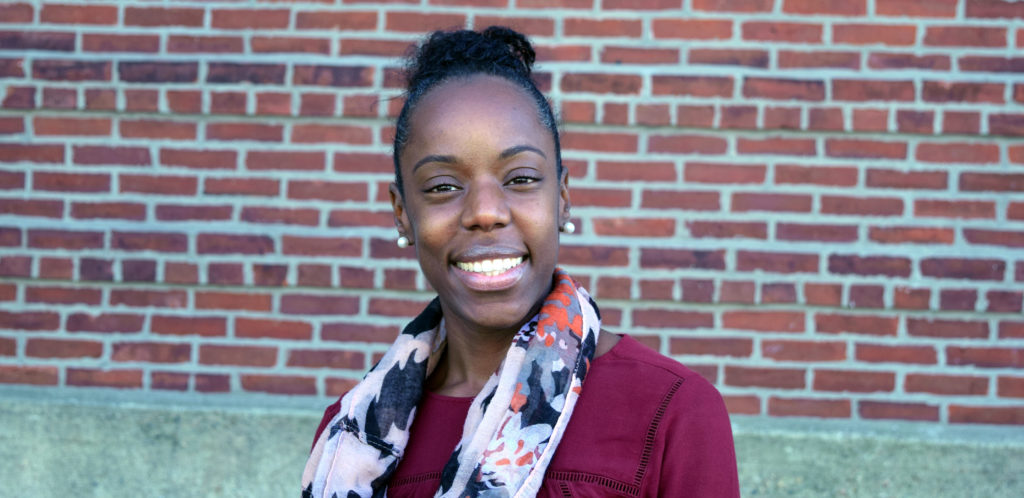
Shakera Walker is the current Director of Teacher Development at Boston Public Schools (BPS), and a volunteer academic mentor for Boston Partners in Education. A former BPS teacher, Shakera stays connected to the classroom through our Motivate program, where she volunteers once a week to work with a whole classroom of Kindergarten students at Winthrop Elementary School. Shakera has been a Boston Partners volunteer for three years, and has returned to work in the same classroom with the same teacher — ToRena Webb-Thomas — each year. We sat down with Shakera to talk about her experience in the classroom from three distinct perspectives.
Q: Was it hard to step away from the classroom as a teacher to go work at the BPS Central Office?
Shakera: Oh, that’s an interesting question. Yes, of course it was hard. Before I started working in the central office I taught for over a decade. Education is definitely my passion and I think working with children is what helps to fuel that passion. Working in a classroom and school is certainly the best place to work!
That being said I was afforded a unique opportunity to go and work in the central office, to more broadly think about teacher leadership, about professional learning and how that impacts the day to day work that teachers engage in at the school level. It was a chance to expand my influence beyond the walls of my classroom, which I think often times given just how complex teaching is and the demands that are placed on teachers, we didn’t often get those opportunities. I saw it as an opportunity to influence and have some impact on not only the teachers in my building, but the teachers across the district.
Q: What is it like being back in the classroom as a volunteer?
While it was exciting to have a new opportunity [at the BPS Central Office], I think it was bittersweet because my love is in the classroom working with students. Just being able to work with children, being able to make a difference in a way that I think you see more directly has brought me great joy and a sense of fulfillment during my career in education. Each day I work with my students [as a volunteer academic mentor], there is never a day that goes by that I don’t feel like the work I and my co-teacher are doing is not having some type of impact on the students.
It was definitely a difficult decision to leave the classroom and it’s something I think about all of the time. Being back gives me the opportunity to really utilize some of the skills and knowledge that I gained as a classroom teacher. Serving as an academic mentor, has enabled me to draw upon those things when I’m working with children. It feels like I am actually serving in a meaningful way and investing in one of our many schools — in a way that is intended to support children and teachers as well. In some ways, I am getting the benefit of seeing the ways in which my work in central office translates into practice on the ground with the people who are most important: our students and teachers.
Q: Do you feel like volunteering in the classroom impacts your job at the BPS Central Office in a positive manner?
Yes! One of the things I think often happens when folks transition out of the classroom, is they can become disconnected from the work that is happening at schools. Oftentimes I think there can be misalignment between what is happening at the school level and what is happening at Central Office — in terms of the policies that are being made and how they both shape and influence what is happening at the ground level for the people who are constantly doing the work: the awesome teachers we have at BPS.
I think by being here I am able to connect the nexus between policy and practice. The best way I can describe it is, it’s about walking the walk and talking the talk. We create a lot of stuff at Central Office and working in a school each week helps me see how those things that we are creating are playing themselves out — or not — in the school. It gives me a window into a classroom, into student learning, that will directly inform the work that I do in my day-to-day role. My role being designing professional learning experiences for teachers and thinking about how we develop opportunities for those who work closely with our students to innovate and pursue learning experiences that helps them solve the challenges they face, and maximizing their expertise, not only for teachers in their building but also for other teachers throughout BPS.
Just investing in the system in a different way, in a meaningful way, in a more practical way, I think is super, super helpful. A lot of what I take from this experience is not just from my mentoring experience with my students but from talking to the teacher, talking to other teachers, and talking to the principal. When I arrive to work after tutoring, I use those questions that come up, those comments, those wonderings and bring them back to our discussions and planning in central office. I’ll say “well this is how we are thinking about this in Central Office but let me tell you what educators told me today at the school I was in”, for example, that document we put out doesn’t make any sense and it’s not really going to help them make their jobs better or easier. It helps me stay grounded. I think it is very easy when you get to the central office to be as I said really disconnected from the work that is happening in schools. I’ve only been out of the classroom for five years but it seems like an eternity. The curriculum, and some of the techniques that I used five years ago are now outdated. I’ve had to learn new things and get support from my fellow educators to improve my practice.
Q: How has your teaching background helped you as an academic mentor?
Even though it is a one to two hour commitment a week, I consider myself a teacher more than I do a mentor, and I take it very seriously. I am being really strategic and talking with the teacher about what activities she’s going to give me to facilitate, which students I am going to engage in those activities with — making sure I really understand the learner profile.
For example, I was working with a student today who had a really difficult time not only writing letters, but identifying the letters. So in this case, I’m already thinking about how to best support this student so that he can make adequate progress. Writing the letters might not be the appropriate activity for him yet. Maybe he needs to practice tracing the letters in sand right now or with shaving cream. Having some tactile ways that he can sort of manipulate the letters before he actually starts to write them with the marker or a pencil may be a good next step.
When I mentor, I draw upon what I know as a teacher to think about the ways I’m going to intervene to support the diverse learners and then thinking about all of the things we often talk about, thinking about all strategies we employ to support student learning. I actually get to try them, I get to test them and see if they work or not. Sometimes teaching is a lot about trial and error. You have to try a lot of things until you get it right for the range of learners in the classroom.
Q: Tell us about one of your favorite volunteering moments
Oh, there are many, but one from this year involves one of my students who has been struggling with learning sight words. There was a time a few weeks back when we engaged him in an activity to scaffold learning his sight words — it was like a sight word matching activity. He hadn’t been able to match the sight words in previous weeks.
So this day, after lots of preparation, lots of support, lots of practice, he finally got it. Just to see not only his excitement and enthusiasm when he was successful at something, but also seeing the light bulb that went off in his head like, “I can do that.'” I was proud to know that I helped a student build confidence in themselves and motivated them to k persevere despite the challenges.
Just today I had a student sitting next to me, and he said “I can’t make a K. I don’t know how to make a K.” I try to help them think about language that is not in a deficit mode, so it is not “I can’t,” it is “I’m still learning how to make a K.” It is not that you can’t make a K, it is “I’m not yet able to make a K.” So really trying to praise their effort more than the absolute that they can or cannot do this.
Two minutes later, sure enough, after I modeled it for him using my “skywriters” and he in turn did the same,, he was able to make two “K’s.” Seeing that moment when he was able to feel super confident about that and I think taking on this notion that in this moment I’m trying to be the best that I could be — I think some of the moments are marked by this idea that you are helping kids constantly recognize and achieve their potential. At four or five years old you are not always necessarily aware of your potential, and the more you have opportunities along the way to be successful, the more opportunities you have for someone to praise your effort and your hard work, the more opportunities you have to practice. I think that makes it all the better.
